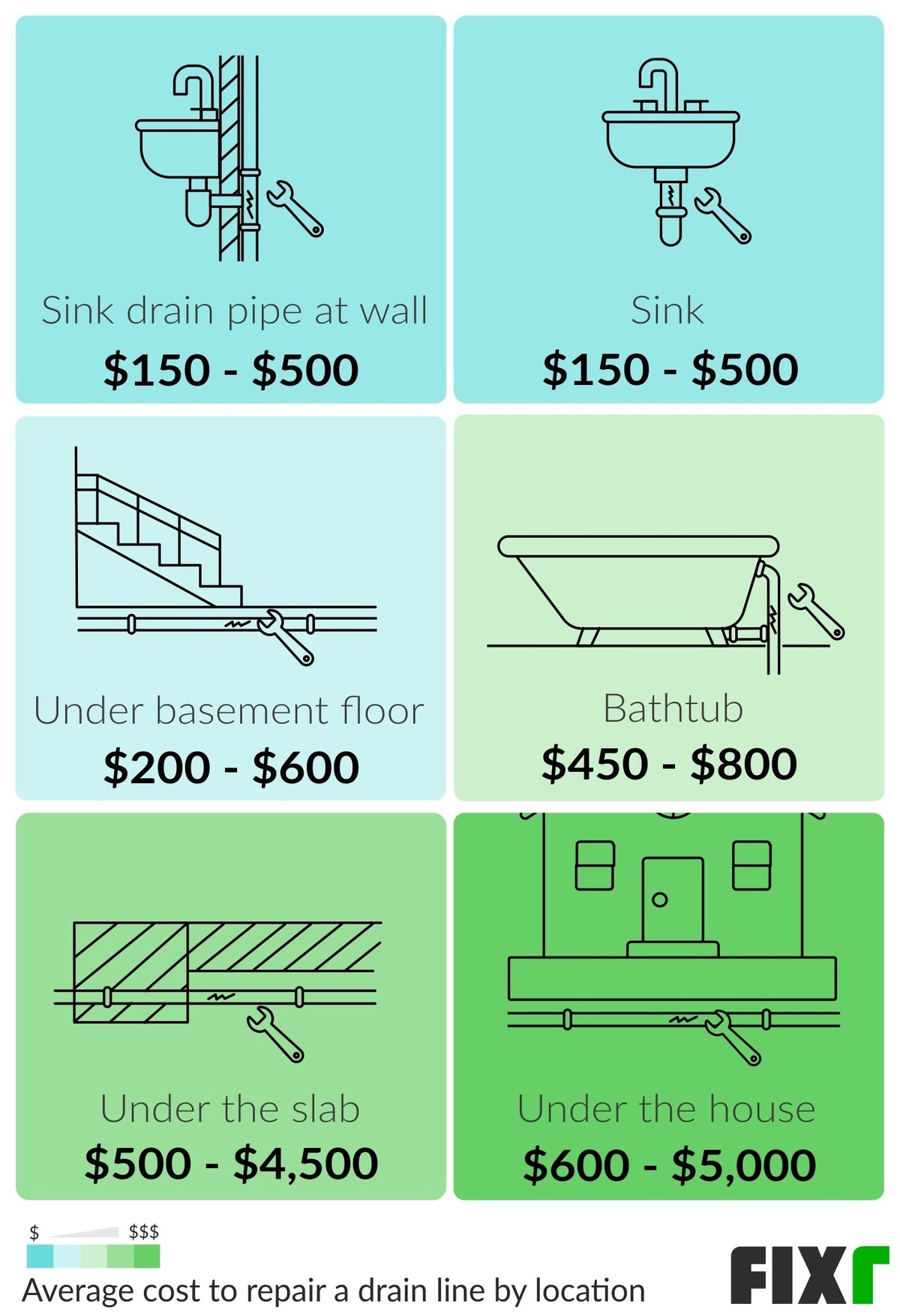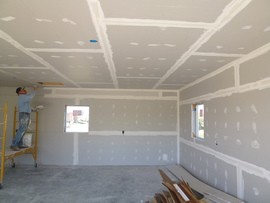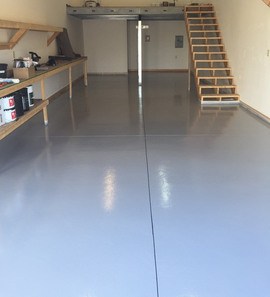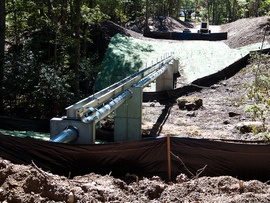How Much Does It Cost to Repair a Drain Line Breakage?
Drain lines are an essential part of the home sewage system. If they malfunction or break, it could cause flooding in and around the home, resulting in costly damage, smell, and potentially bacteria spreading. A drain line may break because of various reasons: corrosion, freezing, persistent clogs, roots, animals, or age. In all these cases, the drain line must be repaired immediately to prevent flooding or other damage to the home.
The national average drain line breakage repair cost is between $400 and $1,500, with most people paying around $600 to detect and repair a broken drain pipe under the floor of any room in the house. At the low end of the spectrum, you can expect to pay $150 to fix a small drain line breakage inside a wall. At the high end, you can pay up to $5,000 or more to have a broken drain line more than 100 feet away from the house excavated, inspected with a camera, and repaired by a professional plumber.
Collapsed Drain Pipe Repair Cost
| Drain Line Breakage Repair Cost | |
|---|---|
| National average cost | $600 |
| Average range | $400-$1,500 |
| Low-end | $150 |
| High-end | $5,000 |
In this guide
Cost to Repair a Drain Line Breakage by Location
Drain Pipe Relining Cost
Cost to Repair a Drain Line Breakage
Drain Pipe Replacement Cost
Drain Line Cleaning
Drain Line Maintenance
How to Protect Pipes?
Sewer Line vs Drain Line Repair
Enhancement and Improvement Costs
Additional Considerations
FAQs
Drain Line Breakage Repair Cost by Project Range
Drain Pipe Repair Cost by Pipe Material
Depending on the pipe material in your home, you can expect the repair project to cost $0.50 to $30 per linear foot for the material only. Some materials are more difficult to repair than others, so they require the contractors to put in more time and effort to fix them, affecting the project’s overall cost. While your pipes may be made of different materials, the most common ones are PVC, copper, cast iron, or galvanized. The cost of material to repair pipes and their most common problems are explained below.

| Pipe Material | Cost per Linear Foot (Materials Only) |
|---|---|
| PVC | $0.50 - $8 |
| Polypropylene | $1 - $15 |
| Copper | $2 - $15 |
| Galvanized | $3 - $8 |
| Cast Iron | $10 - $30 |
Repair PVC Drain Pipe
The cost to repair a hole in PVC pipe or breakage can range anywhere between $0.50 and $8 per linear foot. They are most commonly used for wastewater and soil discharge systems. PVC pipes are also one of the easiest materials to work with, so the cost to repair them is one of the lowest. However, they can break under high pressure, requiring more maintenance and replacement than other types of pipes.
Polypropylene Pipe Repair
Polypropylene is becoming an increasingly popular piping material because it’s easy to work with and very lightweight. Repairing it costs $1 to $15 per linear foot. It provides the same durability as PVC or other types of piping while being very lightweight and easy to work with, which shortens the time required to install or repair them. In addition to this, polypropylene is less likely to release harmful chemicals into the water.
Copper Drain Pipe Repair
If your copper drain pipe needs repairing, you can expect to pay $2 to $15 per linear foot to bring it back in working condition. Copper pipes are becoming increasingly popular because they have higher corrosion resistance than many other piping materials. Copper doesn’t contain iron which means it doesn’t corrode and pollute the water but can still last as long as cast iron pipes, around 70 years. However, suppose the water has high acidity. In that case, the inside of the copper pipes can deteriorate and result in copper piping, corrosion that causes leaks, and can result in mold buildup or drywall 1 damage.
Galvanized Drain Pipe Repair
Most older homes have galvanized pipes, as they were used in almost all home plumbing applications in the past. Repairing these pipes typically comes at the cost of $3 to $8 per linear foot and depends on the pipe materials. Galvanized drain pipes are expected to last around 50 years and are coated with a zinc layer to prevent rust formation. However, with time, the zinc wears away, and the pipes may start rusting and contaminating your water. You will need to have them replaced if you notice any changes in your water supply.
Cast Iron Drain Pipe Repair
Most older homes have cast iron drain pipes as they were a standard up until the 1960s. As the material is sturdier, repairing these pipes is more expensive, with the typical cost being $10 to $30 per linear foot. Cast iron pipes are very sturdy and last between 20 and 50 years if maintained properly. However, keep in mind that they will likely need to be replaced if any sections break. Cast iron drain pipe replacement cost is higher than repairing it. They may start corroding and fill the water with rust, mineral deposits, and sediment, which pollutes it and makes it harmful for the health of the individuals living in the home.
Cost to Repair a Drain Line Breakage by Location
Depending on the breakage location, you can expect to pay between $150 and $5,000 to fix the drain line 2. The cost can be much higher depending on the extra work that will be required. The repair team you have hired must first determine the location of the break and that there is indeed a break and not just a clog.
In most cases, your plumber will attempt to snake the drain from the main clear out near or in your home. If this does not work, a camera is fed down into the drain from the main clear out to determine where the break is located. With that in mind, below are some common drain line breakage locations and the cost to repair them.

| Location | Cost (Materials and Labor) |
|---|---|
| Sink Drain Pipe at Wall | $150 - $500 |
| Sink Drain Pipe | $150 - $500 |
| Drain Pipe Under Basement Floor | $200 - $600 |
| Bathtub Drain Pipe | $450 - $800 |
| Pipe Under Slab | $500 - $4,500 |
| Drain Pipe Under House | $600 - $5,000 |
Sink Drain Pipe Broke at Wall
Repairing a sink drain pipe inside a wall is often a simple task, which is why it costs less than most other drain pipe repair jobs. You can expect to pay $150 to $400 to repair a drain pipe inside a wall. The exact cost depends on the location of the pipe and the severity of the damage. If the plumber needs to find the leak location, it will add $100 to the repair cost.
To repair the pipe, the plumber will first stop the water where the damage is located, cut the wall above the pipe, and locate the spot where the pipe is broken. Once they do this, they will cut away the damaged section and replace it with a new one. If the wall needs to be repaired, expect it to add $250 to $700 to the project cost.
Sink Drain Pipe Repair
Repairing one sink drain in your home typically costs between $150 and $500, with the exact cost varying depending on how easy it is to reach the drain, the extent of the repair, and the material of the pipe. Sink drain pipes can become loose and start leaking if some of the washers or nuts break. These fittings may break due to old age, poor water quality, or many other reasons. In either case, a plumber would have to come, assess the damage, and do the necessary repairs.
Broken Drain Pipe under Basement Floor
If you notice water in your basement or pooling in your backyard, this may indicate that you have issues with the drain pipe under your basement floor. Repairing the pipe costs $200 to $600, although the most common solution to replace it, which costs $60 to $150 per foot. To repair the pipe, the plumber will first need to assess where the damage is located and then dig up the cement to reach the damaged area of the pipe, which can increase the overall cost of the project.
Bathtub Drain Pipe Broken
The average cost homeowners pay to have a broken bathtub drain pipe repaired is between $450 and $800, with the cost going higher if the damage is closer to the bathtub. If the pipes are near the bathtub, the plumber may recommend replacing the whole bathtub as it may be impossible to repair the pipes without damaging the bathtub. The bathtub installation will add around $1,500 - $5,000 to the overall cost.
Broken Drain Pipe Under Slab
If the broken drain pipe is located under the slab, it can be one of the most expensive pipe repairing projects, costing anywhere between $500 to $4,500 to detect and repair the pipe. The high cost results from the need for the plumber to break through the slab to reach the damaged pipe. This repair is a complex and time-consuming process. Often, repairing the pipe can break the slab, so it would have to be replaced partially or fully. Repairing or replacing a foundation can cost anywhere from $500 to $21,455, depending on the size, material used, depth, and style.
Broken Drain Pipe Under House
The underground drain pipe repair cost can range between $600 and $5,000 depending on how difficult the pipe will be to reach and repair. Similar to repairing pipes under the slab, if the pipe is located under the home, the plumber would need to excavate the ground and locate the source of the damage. This extra work is why the cost is higher for this location. Sometimes, camera inspection will be needed to detect the exact location of the issue, which will add $250 to $400 to the project cost.
Drain Pipe Relining Cost
Pipe relining is replacing damaged pipes by installing a new pipe called a lining into an existing damaged pipe. The pipe relining cost per foot is around $50 to $250, depending on the exact pipe type, fittings, mechanical couplings, and the amount of work involved with the project. In most projects, the plumber uses an epoxy 3 mixture to create a pipe lining inside an existing pipe and seal the cracks, leaks, or replace a section of the pipe without taking out the whole pipe or repairing it on the spot.

| Method | Cost per Foot (Materials and Labor) |
|---|---|
| Pipe Bursting | $50 - $250 |
| Internal Pipe Coating | $50 - $250 |
| Pull In Place | $60 - $200 |
| Cured In Place | $80 - $250 |
Pipe Bursting Cost
The pipe bursting cost is typically $50 to $200 per ft. It’s used on areas that require pipe replacement or on pipes that are severely damaged. To do the process, the plumber will have to dig out two 4-foot access points at the ends of the pipeline and then use hydraulic power to break the old pipe and pull a new one behind it. Pipe bursting is very popular as it can prevent root intrusion for up to 100 years.
Internal Pipe Coating Cost
If the pipe has started leaking into the surrounding soil, you can resort to internal pipe coating for a cost of $50 to $250 per foot. To do this, plumbers would have to completely drain the water from the pipes and let them dry out. Then, they spray the inside of the pipes with a thick epoxy coating. When it dries and hardens, the epoxy seals the leaks and cracks in the pipe, ensuring its durability and unobstructed functioning.
Pull In Place Pipe Lining
Pull in place pipe lining is more fit for pipes with cracks or large gaps and costs homeowners between $60 and $200 per foot. To do this process, the plumber will fix the epoxy-coated liner into an existing pipe. They will have two access points--one to insert the liner and the other to pull it through. The overall cost depends mostly on the epoxy pipe lining cost, as it is the main component used in the process.
Cured In Place Pipe Lining Cost
The cured in place pipe lining cost per foot is between $80 and $250 per foot and involves creating a new, seamless pipeline inside an existing one. The new pipe is smaller in diameter, so it can fit through the original pipe without replacing the whole line. Cured in place piping does minimal damage to your property as the plumber will dig only one access point to reach the damaged pipe.
Cost to Repair a Drain Line Breakage
The cost to hire a plumber ranges between $45 to $200 per hour, with most plumbers charging around $120 per hour for common projects like drain line breakage. As most repairs take a few hours, the labor costs are around $450 for a three-hour repair job, while the remaining $150 is the cost for materials.
Drain lines situated deep within the ground are difficult to access and are generally more cost-effective compared to home-centered projects. Just the cost of repairing the drain, without the cost of reaching it, will be around $100 more just for moving out of your home.
If the break is situated outside your house, repairing will require excavating the area above the pipe. This can be a costly and time-consuming process because drain lines are buried several feet under the soil and can extend the full length of the property. Excavation costs can add around $1,000 to the total, and the costs go up as you move further from the home.
If the breakage has occurred inside your home, the floors, walls, and ceilings will likely suffer from flood damage. If the water leaked out from the broken drain has caused collateral damage to your house or property, water damage restoration will cost between $3.75 to $4.50 per sq. ft.
Cost to Repair a Collapsed Drain Pipe
Sometimes, a drain pipe may collapse and require replacing, which costs homeowners $50 to $300 per linear foot. As the earth shifts, some pipes may sink lower than others, called collapsed pipes, which will trap water and debris and cause low water pressure. If the damage is extensive and runs a long distance, you may need to replace the whole drain line.
Cracked Drain Pipe Repair Cost
Repairing a cracked drain pipe comes at an average cost of $50 to $250 per linear foot. Your pipes may crack for several reasons. Pipes may crack due to pressure, age, freezing temperatures, or tree roots. This can cause water buildup or affect the water pressure in your home, which is why it’s important to repair them as soon as you notice signs of cracks. However, if the damage is extensive, it may be more cost-efficient to replace the whole pipe.
Drain Pipe Replacement Cost
Depending on the location of the pipe, replacement costs start at $100 per foot and go up to $650 per foot if the area is difficult to access and excavation is required. Replacing drain pipes is sometimes a more cost-efficient option than repairing if the damage is severe or runs along a bigger area of the pipes. It’s also a good idea to replace your drain pipe when you’re renovating and know that they are old and worn out.
Drain Line Cleaning
You should take preventive measures to ensure the drain lines are functioning properly and minimize the risk of pipe breakage. Scheduling regular drain cleaning for an average charge of $150 to $600 ensures that the pipes are free of debris and blockages. In cases when there is a serious blockage in the drain pipes, you can expect to pay up to $1,000 to unclog them by using hydro-jetting.
Drain Line Maintenance
Regular inspections and proper maintenance can reduce the risks of pipe breakage. There are a few simple but very effective ways to protect your pipes that can make a big difference in their longevity and regular functioning. For one, you can install a garbage disposal or place a strainer over the drain to prevent larger chunks of food or particles from going into the drain and getting stuck. Avoid pouring grease or oil down the drains as they can harden the debris and cause clogs and flooding.
How to Protect Pipes?
Aside from doing regular maintenance, to ensure the pipes will last long in your home and won’t break, make sure to buy quality pipe materials to reduce the risk of complete line failure. You should also properly insulate your outdoor pipes to keep the water from freezing due to low temperatures and break the outer surface of the pipes.
Another important thing to do is to avoid planting trees near drain lines 2 or opt for slow-growing trees. Drain lines serve as a great source of oxygen, nutrients, and water for tree roots. Roots can find their way inside a pipe resulting in breakage. The repair can cost hundreds to thousands of dollars. As a preventive measure, note where the pipes are located and create a barrier between the drain pipes and the trees.

Sewer Line vs Drain Line Repair
The sewer line 4, also known as the mainline, takes your wastewater from inside your home to the sewer main located underground in your yard or street. Drain lines, on the other hand, are connected to the sewer line and take water from several spots in the home, such as sink drains, shower drains, toilet lines, and more. You have one main sewer line in your home but can have multiple drain lines.
Repairing a drain line is simpler than repairing a sewer line. In most cases, the plumber will work inside the home for a short time to fix the issues with the pipes, which is not the case with repairing a sewer line. If the problem with the sewer line is underground, plumbers must dig out the ground to get to the pipes, which is an extensive and time-consuming job.
Enhancement and Improvement Costs
Drain Line Video Inspection
The plumber may resort to drain line 2 video inspection to detect the issues. Video inspection adds $200 to $400 to the overall project cost. To do this, the plumber uses a camera connected to a flexible cable that is snaked into the pipe and then uses a monitor to watch and assess what is going on in the pipes.
Removing Roots From Drain Pipes
If your pipes are located in an area with trees, roots may grow through them, which can cause clogs or break them. Removing tree roots from drain pipes adds $100 to $600 to the overall project cost if the pipes don’t require replacing. If the plumber uses a power auger 5 to remove the roots, the cost is around $100 to $300. Hydro jetting is the more expensive option that costs $300 to $600.
Tree Removal Cost
The cost to remove a tree depends on the size of the tree, with the most common cost ranging anywhere between $400 and $900 for a single tree. Many homeowners need to remove a tree if it’s near the pipes to avoid it causing damage to the sewer or drain pipes. As removing trees is a complex and dangerous job, always hire a professional to do it.
Water Damage Cleanup Costs
If the drain breakage is severe or your room’s exposure to water is prolonged, it may cause water damage which is often quite expensive to repair. Most homeowners pay between $2,000 and $5,000 to restore water damage. The costs can go as high as $8,000 if the electrical installation in the home is broken.
Additional Considerations and Costs
- Repairing lines is not a basic DIY project since it requires excavation of land and plumbing, depending on the cause of the breakage. DIY plumbing can result in new costs. Therefore, it is advised you contact a professional carpenter or plumber.
- If your house is situated away from the city line, costs can be increased by about $600 to $1,600 for a whole replacement. This is because of the added cost of materials.
- A majority of homeowner insurance policies don’t pay for drain line repair.
- If the break is located near the house, or you have a septic tank in your home, repairing it is most likely your responsibility. A break in the mainline may be the responsibility of your city or town, so the town would pay the repair costs. However, in other instances, the repairs will be your responsibility.
- All work with sewer drains, inaccessible pipe replacements, new plumbing, water heater installations, and moving existing plumbing will need a permit. While they differ from state to state, the average cost of a plumbing permit is $75.
FAQs
- How much does it cost to fix a broken drain pipe?
The average cost to repair a broken drain pipe is between $400 and $1,500, with most homeowners paying around $600 for a pipe repairing project.
- How much does pipe bursting cost?
Underground pipe replacement or pipe bursting can cost homeowners between $50 and $200 per foot.
- Are broken drains covered by insurance?
The majority of homeowner insurance policies don’t cover drain line repairs.
- How much does it cost to fix a collapsed pipe?
Fixing a collapsed pipe may require replacement, which typically costs between $100 and $200 per linear foot.
- Who is responsible for a collapsed drain?
It’s the homeowner’s responsibility to repair a collapsed drain.
- How much does it cost to dig up a pipe?
Dig and replace method is the most common pipe replacement method used, typically costing $50 to $250 per foot.
- How much does trenchless pipe repair cost?
You can expect to pay between $50 and $250 per foot to have a trenchless pipe repaired.
Remodeling Terms Cheat Sheet
Definitions in laymen's terms, cost considerations, pictures and things you need to know.See full cheat sheet.
 1 Drywall: Type of plasterboard, commonly used to build walls and ceilings, composed of gypsum that is layered between sheets of heavy paper
1 Drywall: Type of plasterboard, commonly used to build walls and ceilings, composed of gypsum that is layered between sheets of heavy paper
 3 Epoxy: An adhesive, plastic, paint, or other material made from polymers containing epoxide groups. Epoxy is best used for bonding or for creating a protective coating
3 Epoxy: An adhesive, plastic, paint, or other material made from polymers containing epoxide groups. Epoxy is best used for bonding or for creating a protective coating
 4 Sewer line: Principal pipe in a sewage system
4 Sewer line: Principal pipe in a sewage system
How much does it cost to repair a drain line breakage in my city?
Cost to repair a drain line breakage varies greatly by region (and even by zip code). To get free estimates from local contractors, please indicate yours.




